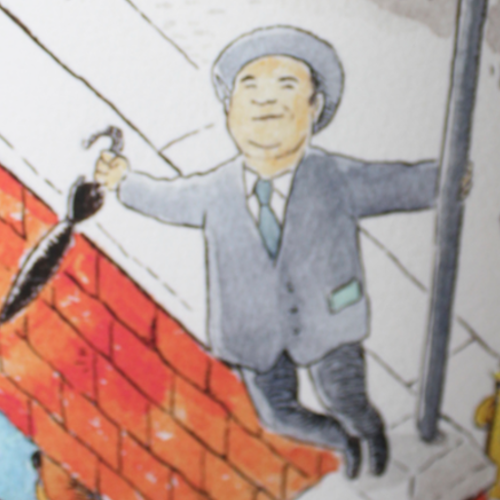
Image courtesy of i.pinimg.com
Her name was Pauline, but she went by Paule. She would frequently mention to Louie that if ever they had a daughter, they must give the child a male sounding eponym such as Toni or Billie, a name in which the spelling alone identified the gender of its bearer. A feminine twist to anything masculine pleased Paule… she wore men’s button-down shirts with the hem knotted at the midriff and tied her pony tail in men’s handkerchiefs… which was why in college she had added the “e” to her self-designated nickname; the “e” had saved her professors from mistaking her on paper as a man. Paule was young and smart and pretty, and her husband would wonder what might have been had she had a long life.
Paule Mercado had attended Smith College. A higher education in America was a natural course for a girl who had been enrolled at international schools in three different countries, the last having been high school in the Philippines. Her major: Women and Gender Studies. A law degree from Columbia University added to her resumé, followed by a stint as a paralegal, during which she met Louie
“She was alone at the luggage claim and so was I,” Louie said to his brother, more as a verbalization of his memory than as an account. “I helped grab her luggage from the conveyor belt. She had two suitcases, and they were heavy. What a long flight that was.”
“For you it was long,” said Ron. “You were flying from Los Angeles to Manila with a stop-over in Tokyo. She boarded the plane in Tokyo.”
Louie stared at Ron, taken off guard. He didn’t recall ever providing Ron this detail. Even more odd was Ron’s pristine appearance. Hair slick, a tailor sleek black suit, and a tan as if he had just come from the beach… Ron was dressed more for a dinner function than a funeral. Louie himself normally equaled his brother in sartorial sharpness… both boasted a trim waist and broad shoulders that clothes complimented… only on this day wet spots darkened his arm pits, and he was mindless that his coat, which he had intended to toss behind him on the sofa, had landed on the floor.
Air-conditioner notwithstanding, the study room was stuffy. Three generations of Tolentinos covered the walls, from grandfather Teodoro Tolentino in a handshake with General Douglas MacArthur to his progenies and grandchildren at various stages in life. Turbaned warriors astride horses that decorated a Persian carpet rendered the floor a chaotic battleground. Mementos cluttered table tops: a silver dagger gifted from the Sultan of Brunei, honorary plaques, pocket-size ivory perfume bottles from China…
Although Louie and Ron never knew their grandfather, images of a bulldog scowl behind a whiff of cigar smoke rooted the man’s presence on this block in an old district of Manila. A mere handful of neighboring mansions from the pre-war days, when the Philippines was still an American colony, remained standing. Like eye sockets in decomposing skulls, their glassless windows opened into dark spaces. On the street, ignition pipes to vehicles that jammed bumper to bumper coughed black smoke, weeds sprouted through pavement cracks, and trash overflowed from a garbage barrel in front of a McDonald’s.

Image courtesy of i.pinimg.com
As the other families established a new neighborhood across the city, in a section that in the years after the war became the commercial center with hotels and banks lining thoroughfares, Louie’s and Ron’s father maintained Grandpa Tolentino’s vision of a family estate that would endure for generations. Modeled after an Italian villa, the house surrounded a courtyard. An inner gallery on the second level overlooked a Tuscan fountain amid bougainvillea plants in perennial bloom, and down a grassy slope from the outer facade, a stone wall as thick as a fortress rampart severed the outside world.
Paule had instantly fallen under its spell. She had given up a career in New York for this. Despite marriage, she had busied herself as a freelance writer, penning magazine and newspaper articles on the latest happenings in the Philippines that ranged from architecture to politics. She was in the works on producing a talk show so that, through TV, she could gain an even wider audience.
Success hadn’t hindered Paule’s desire for a family. Quite the contrary – success bolstered it. Both Louie and she were ready; they had been married for two years.
“She was alone at the luggage claim and so was I,” Louie repeated.
“You sound like you had been cursed to a life of solitude until she came along.” Ron said.
“I was.”
“No, you were not.”
“If I wasn’t, then now I certainly am.”
“Oh, please, Louie. Don’t be so dramatic.”
Louie could have grabbed his younger brother by the collar from across the coffee table and slugged him. Such daftness was crude. Could Ron actually be trivializing Paule’s death? The coroner attributed it to an allergic reaction to peanuts, an accident. Louie and she had been dining at an Indian restaurant they frequented, the proprietor of which was a family friend. The kitchen staff could not have been so clumsy as to overlook such a grave dietary restriction; of this, Louie was certain. Paule and Louie had such trust in the staff that they had left the adrenaline syringes at home.
“Gago ka,” he said to Ron in Tagalog, which he only spoke when vexed, though Ron hardly took him seriously on such moments, particularly on an insult of being stupid, for stupid, he was not.
“You will never be alone,” said Ron.
“You will never understand.
“I do. I understand very well. It’s you who doesn’t.”
“What don’t I understand? Go ahead. Tell me.”
“You didn’t love her.”
“What?”
“You didn’t, Louie.”

Image courtesy of pixdaus.com
Ron spoke with a tone part all-knowing, part plea. And his eyes, earnest as those of a puppy, gave him a hungry look. He had had that expression his entire life. No, Louie couldn’t punch him. He had never punched anybody.
“On what basis do you insult me with that claim,” he said, “insult the memory of my wife? She has been buried a few hours, and the last mourner has just left this house. How dare you.”
“And now we’re sharing a bottle of red wine, just the two us, just like old times.”
“Your car was at the restaurant parking lot.”
“Sometimes, I like to drop by to say hello to the chef.”
“You doused our food with peanut oil.
“Did I?”
“I can report you to the police.”
Ron bowed his head as though he were a kid scolded for his mischief. “You think they’d do anything?”
“I could pay them to lock you up.”
“I could pay them even more to set me free.”
And therein was a bickering between the brothers that persisted since childhood: the older threatening to incriminate, the younger challenging the threat, and neither acting beyond words. They were never this way with their sisters and third brother, who five years Ron’s junior and married with his own kids, had always been an outsider, no matter that he lived on the estate. Noel didn’t share their memories of their mother. By the time he was a toddler, she was out of the house, shacking up with another man. As for sisters Diana and Claudia – the former being the eldest and the latter born between Louie and Ron – they were more attached to their father to heed their mother’s attention. Or ire. Their mother had been a drunk who would lash out at Ron, a belt or a stiletto her weapon of choice, while Louie would sacrifice himself as his brother’s shield.
Louie nearly laughed for mentioning jail. He felt as a fool did after cracking a bad joke. Ron had no sense of severity. He had been a weird child. An affinity for his sister’s Barbies, fruit scented stickers, and tutus aside, he stuffed anything in his mouth from his buggers to bits of Styrofoam that packaged Louie’s model war planes and match box cars. So that he’d stop, Louie would warn that he’d tell on him to their mother. The more he warned, the more daring Ron became in his attempts to digest the inedible. Ron went so far as to nibble on soil and smother soot on walls. That Louie kept mum regardless turned into a matter of the boy crying wolf. Such a provocateur was Ron. And what would provoke their mother to fits of violence could be as minor an act as refusing to sit when told to do so.
“Do as she wants,” Louie would urge.
Yet Ron would remain recalcitrant, his eyes wide, neck stiff, and mouth agape in mimicking an exclamation point. The kid might as well have been watching a TV melodrama. He seemed to glee at the sight of a beautiful woman gone hysterical, for their mother was beautiful, astonishingly so. Even Louie, upon her every snap, felt a tremor at the dichotomy between a visage alabaster lustrous, one with coral pink lips and eyes the brown of russet stone, and the ugliness fulminating beneath.
II
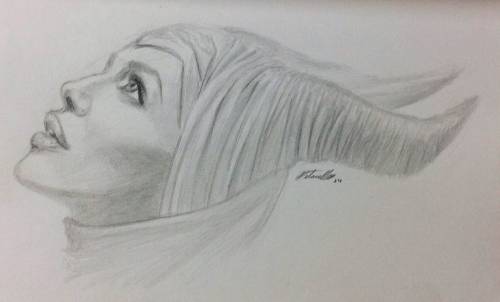
Image courtesy of tumblr.com
Ron was five when their mother first took a shoe to him, while Louie was nine. Louie didn’t ask Ron what he had done; it had never crossed his mind to. They were in the playroom. Prints of Disney characters hung on the walls. Their mother had just given birth to Noel, and his crying permeated the house non-stop. Through the door, Louie overheard an exchange of words between their mother and father, while around him, Peter Pan, Pinocchio, and Sleeping Beauty were depicted in dire situations with Captain Hook, Stromboli, and Maleficent respectively: a sword fight, incarceration, and eternal sleep upon the prick of a finger on a spindle needle. Being scenes from a fairy tale, they attested that wickedness existed exclusively in the realm of make believe, and always as something vanquishable
The image of their father as the door opened would be the predominant image that would stick with Louie over the decades, overshadowing even that of the man tied to tubes in a cancer ward twenty-five years later. Their father had replicated Ron’s exclamation point stance, only with more austerity. He possessed a voice the rumble of a bull dozer and a build sturdy as a stone pillar.
Upon entering the playroom, their mother appeared to be dipped in champagne. The sheen to her golden gown resembled the effervescence of the liquor she often imbibed. From down the hall, Noel’s wailing trailed their mother, strident and deafening. Ron was on his stomach, on the floor, perusing an alphabet book. Sudden as lightning, their mother with shoe in hand struck his behind… once… twice… thrice…and then Louie, who had been sitting beside Ron, positioned himself on top of his brother so that his own backside received the blows. Protecting his younger brother was a natural impulse, one instilled in Louie by the Tolentino creed of family sacredness with which the ancestral images imbued the house: Tolentinos must always fend for each other, whatever the situation, no matter the cost.
Their mother slipped her shoe back onto her foot, straightened her gown, and stepped back into the hallway. Amid Louie’s tears, Ron kissed the welts on his brother. He would always nurse his brother this way, and long after their mother would leave them once and for all, through high school and on homecomings during college breaks, the two would continue to sleep in one room; sometimes, just as on nights that thunder had frightened Ron as a child, in one bed.
III
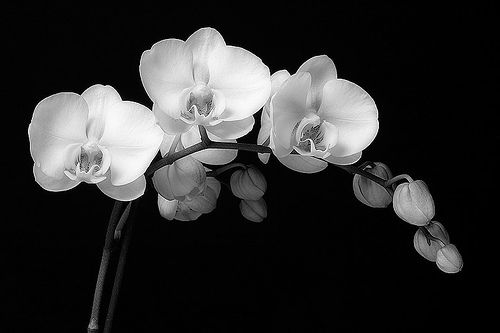
Image courtesy of askideas.com
Before the night she died, Paule had returned in the early afternoon from Hong Kong. She would frequently fly there due to its proximity to Manila, and shopping was such that Hong Kong had been ideal for updating her wardrobe. With a public persona in mind, she was especially particular about her clothing on this last voyage, inspired by the likes of Marlene Dietrich and Charlize Theron, movie stars celebrated for their elegance yet who knew how to feminize a tuxedo. Theirs was an image utterly Western in its aesthetics. “Female debonair,” Paule called such a look. Every detail to her, from the length of a black skirt to the red stitches on a white corporate shirt, was crucial.
To Ron, Louie said of his wife, “She’s a modern fixture amid these antiques.”
“She’s beautiful,” Ron said, “no doubt about that.”
The brothers were in the study, the sole room in the house where they could be alone. Diana and Claudia lived with their husbands in the commercial center, while Noel and his wife occupied a wing at the opposite end of the house, one decked with photos of his own brood. Paule herself didn’t care much for the study; it was too steeped in the past. “So many strangers on the walls,” she had told Louie on their wedding night. “Makes me feel that I’m intruding.”
In the courtyard below, Paule was instructing the gardener on where to position a collection of orchid tree limbs. Louie had ordered half a dozen while she was in Hong Kong. Their delivery on the afternoon of her return was his welcome back present.
The white orchids on tree limbs the black-brown of ancient sequoia mirrored the sight of Paule. She was cool and collected in a dress sun bright in contrast to the gardener, who with hands parched and brow sweaty, was the hue of coconut husk.
“She’s demolishing the playroom,” Ron said, a wine glass in hand as he stood beside his brother at the window.
“You exaggerate,” said Louie. “She’s redecorating.”
“Redecorating is my job.”
“That’s what you do for other people, for other homes. This is our home, Paule’s home.”
“Green and yellow. What kind of colors are those?”
“They evoke a garden, grass and leaves growing, a burst of life.”
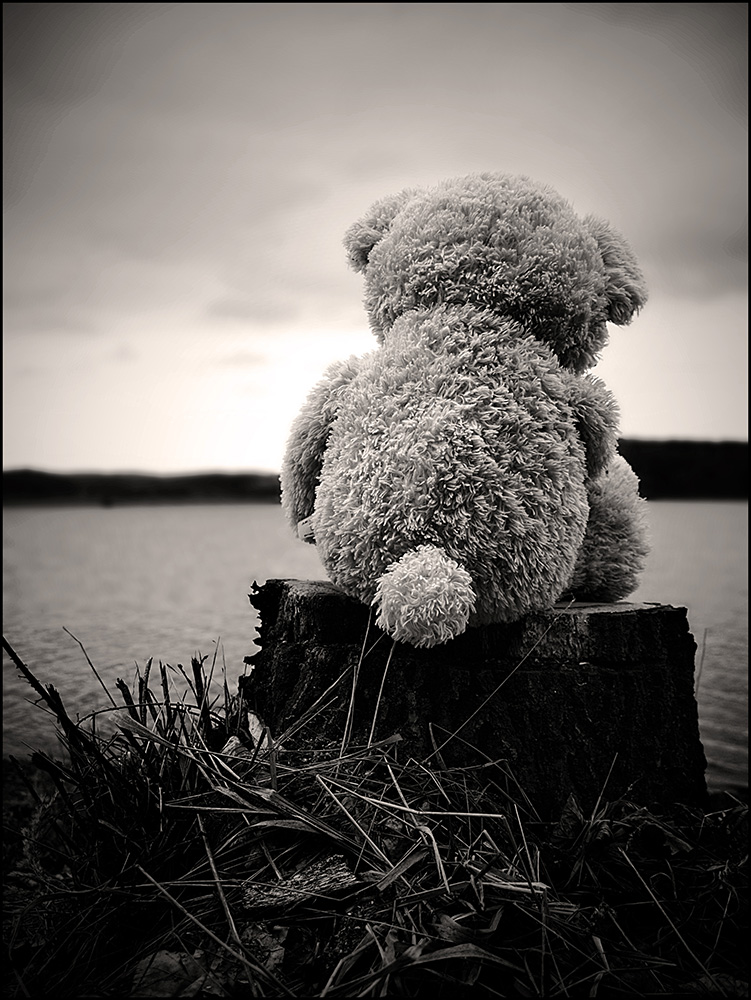
Image courtesy of godfatherstyle.com
“Why not pink since it’s a girl she wants?”
“We want neutral colors.”
“You were never so unconventional.”
“It could be a boy.”
“My bear, she got rid of it.”
“Bear?”
“The stuffed bear.” Ron didn’t sound upset as much as he did wary. He watched Paule in the courtyard below, never veering his eyes away as if her pruning a plant was an act of defiance. “It sat in the corner of the playroom.”
“I told her she could,” Louie said.
“That was one beautiful memory of my childhood. One.”
“I’ll get you another bear” – a sardonic chuckle – “a pink bear.”
Ron had given the bear a name – Friendly. As children, Louie and Ron would talk to Friendly, imagine him responding to their every remark and question. Everything they imagined him say was an assurance of everlasting devotion: “We’ll play again… I like you, too… We’ll have more fun…”
“That bear,” Ron said, “he filled the entire store window a giant piece of happiness with arms and legs to sleep on and a cushion belly to lie on. Mommy put a price on him the store couldn’t refuse, and he wasn’t for sale.”
“One happy, beautiful memory,” said Louie.
“We loved Friendly. We would sleep on him. He had the softest fur. She bought him because of you, really. You pointed him out.”
“Because you wanted him.” Louie shut his eyes in conjuring another memory. “Toy cars on an icing race track.”
“She baked,” Ron said. “I forgot about that. Another happy memory for you. Your eleventh birthday, the last she ever celebrated with us.”
“Paule bakes, too. That will make for plenty of happy memories for me and our children.”
“She’s not even pregnant,” Ron said.
“I have plans – a daughter and a son or two daughters and two sons,” Louie said. “A son to perpetuate our name. A son.”

Image courtesy of cliparts.co
“Noel already has three boys.”
“But I’m the eldest among us Tolentino males.”
“She’ll leave the kids with the yayas.”
Louie shook his head and tightened his lips. At last, an emphatic no. “All mothers already do that. You underestimate Paule. She likes kids and held summer jobs as an au pair. So… no… she won’t be the typical Filipino mother who will have the yayas raise her babies.”
“Au pair… summer jobs…” Ron could barely conceal his drunken disdain. “How so not us. Now I understand why you married her. You want a high class maid, one who talks politics no less. She’s over your head. The things that come out of her mouth, we don’t think about those things.” His disdain turned to laughter. “The look on her face at your engagement party, when she was about to take a bite of chocolate cake and I joked that it had cashew nuts.” Ron simulated her expression of horror.
“If I were her, I’d hate you, too.”
“But you don’t hate me. How do you explain that, with all your study of law and logic, with all the cases you’ve won? You will never hate me.”
Paule in the courtyard was smelling an orchid. Her lips were moving. She could have been singing or she could have been whispering to the orchid to bloom.
“Baking isn’t the only thing they have in common,” Ron continued. “Mommy had a thing for orchids. She would pat orchids as though they were puppies. Then again, she might have kicked a puppy. Good thing we never had pets.”
“That’s where the similarities end,” Louie said. “Paule would never kick a puppy. She would never hurt anything or anyone.”
“How do you know?”
That night would have marked the beginning of a real life for Louie. That night Louie would have proven Ron wrong. A family of Louie’s own would have been a reality after that night. That was his plan. Somehow, Ron knew this, just as he seemed to know Louie’s every thought and emotion before Louie himself became conscious of them, like a spirit that inhabited Louie’s body.
IV

Image courtesy of wordpress.com
You didn’t love her… Perhaps Ron was right. What did Louie know of love? Paule had an online membership to The New York Times, watched indie and foreign films on Netflix, and was unrestrained in her criticism of high rises supplanting Manila parks as much as she was of the church’s stance against birth control. Louie neither possessed an opinion on the Afghanistan War nor heeded much notice to the ever increasing abundance of shanties along the Metro Manila Skyway. As for films, he regarded them as most Filipinos did – mindless distractions – and so he was satisfied with the Hollywood block busters that screened simultaneously in mall cinema complexes throughout the metropolis.
The common ground between Paule and him centered on her career; Louie delighted in her ambition. A self-reliance he had sensed in her at the airport when they had met was the characteristic that had initially attracted him. The upright posture, the straightforward gaze, the gray bag and matching gray shoes… all gave her a determined air. Then there was the reason for her return to Manila: “Moving to study in the States was an adventure, then working in New York. Now it would be an adventure to come back to the Philippines to use all I’ve learned. And I miss my family.”
Paule’s suitcases were charcoal-shaded Samsonite. They were of sturdy plastic and modeled after an industrial box. The instant Louie grabbed hold of one, he pictured daylight permeating the rooms and halls of the Tolentino estate, rescuing from the shadows the family photos that covered the study walls. The photo that shone the most brilliant was of Louie, Ron, and their sisters when Noel was just born. They were posing with their parents. Their father was standing behind a chair where their mother was seated. She had an arm raised across her bosom so that she could hold his hand that was resting on her shoulder. With the other, she cradled Noel. Father and mother were both smiling, radiantly so. Promise enlivened that photograph, the promise of familial loyalty and harmony, the promise of love.
In contemplating the meaning of love, Louie was certain of what love was not. Love was not the infliction of physical pain. Love was not abandonment. Love was not betrayal.
So here he was with Ron, drinking from a single bottle of red wine as if sealing a blood pact, in a room private to them, in a house brimming with a history nobody else would ever share.
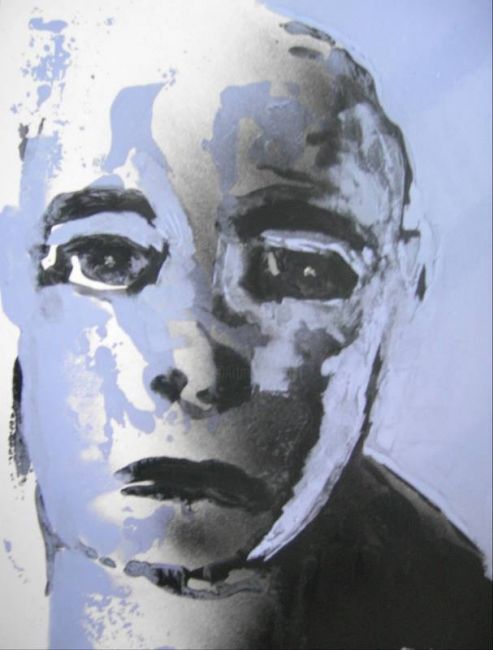
Image courtesy of artmajeur.com
“She would have been a good mother to my children,” Louie said. “You never know.”
“Exactly,” said Ron. “You never know.”
“No… No… I do know… She would have been a great mother. She came back to Manila to be close to her family. She loved family. She would have been a kind and caring mother. And I… I would have been a good father. My kids and my wife…. my own family… they would have meant everything to me.”
“Yes, they would have.” Ron’s face beamed as though Louie had reached a realization that had eluded him for too long. “That’s why I had to do it.”
